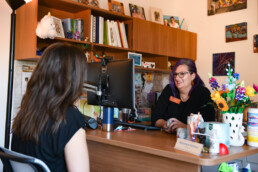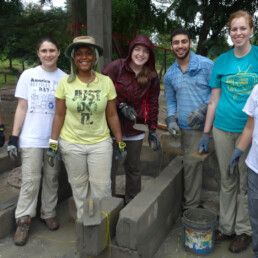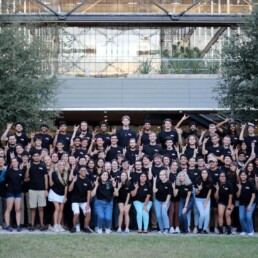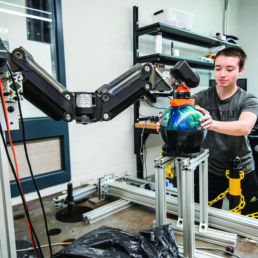by Ramces Luna
For parents and students alike, going to college is one of the more stressful, and also exciting, parts of life. So much to navigate. So many opportunities.
The Cockrell School’s Engineering Student Services plays an important role in helping students build their new support systems upon arriving on campus. This group helps students with all aspects of the UT experience, with academic advisors and support staff, the scholarship and recruiting program, study abroad program, student life office, career center and belonging and engagement programs.
We sat down with one of our students’ favorite advisors — Mckinlaye Harkavy, assistant director of advising at Engineering Student Services — to learn more about the advice she gives to students, the trends she’s seeing (the ’90s are back!) and the challenges today’s students face.

What advice would you give parents to help their students get ready for college?
First of all, congratulations for helping your student get to this point where they are going off to study at one of the premier engineering programs in the world! The best advice I can give is to understand that your relationship with your student is going to change — they will be independent and make decisions, both good and bad, without consulting you first, and they will likely not report in on everything happening in their lives. As a parent, you’re used to being the coach: making decisions about playing time, helping with practices, getting them ready for games. But now, as a parent, you’re in the stands watching how they do when they play. You no longer have the same access or the same role, but you should trust that you have done great work getting them to the point they are at now and know that they will be fine. And just because you’re not in the dugout with them, doesn’t mean they are alone. They have new support systems and resources, and you can sit back and relax and enjoy the show, knowing you helped to get them to where they are today.
What trends are you seeing among students over the last five years?
This generation of students is so inspiring! All of them seem to care deeply about the environment and creating positive social change, which is great to see. The creativity our students bring to their problem-solving projects is always amazing to me, and how they think of solutions is mind-blowing. Every semester I am amazed with how resilient these students are and what they are thinking about in terms of how to actually change the world.
On a lighter note, ’90s fashion and music is back! As a ’90s kid myself, it is weird seeing the things I wore and listened to growing up be cool
again.
Tell us three things every Cockrell student should do/participate in before they graduate?
Study abroad. There is a big world out there just waiting for you to explore. We have so many opportunities for our students to study and travel abroad, and it is one of the most rewarding experiences you can do while in college. I encourage every student I meet with to take that leap — be it Maymester, summer, a full semester, or a program like Projects with Underserved Communities — and study abroad.


Join a student organization. Student orgs are more than a resume entry. They are a way to expand your knowledge and apply the skills you are learning in the classroom to practical, hands-on projects. And it’s even better if you commit to it by participating in events or joining the leadership team. They are also a great support network of other students at UT with similar experiences. Finding your people
is an important aspect of college, and it’s so much easier when you join a student organization that shares your interests and values.
Get involved with research. Even if you don’t think it’s for you, still give research a try. Research offers so many opportunities to build on current skills and learn new ones, as well as develop relationships with faculty. It will be one of the most valuable ways to spend your time.

What are the biggest challenges facing students right now, and how can we help them?
Not a surprise here, but COVID really changed the educational landscape for our students. The balance of online, hybrid and in-person learning is still being figured out. Add to that the year+ that many of our students only had online learning options, and we are seeing some significant challenges with academic preparedness in reading and math, as well as mental health struggles. Luckily, we are aware of these hardships and are constantly adapting to the environment to support students where they are, both physically and mentally. But, we cannot read minds. Asking for help is hard, but it is a necessary skill to be successful in life and students can start when they are in college. There is no shame in needing assistance — it’s what we are here to provide!
Also, students are hyper competitive with each other, and they don’t need to be. Everyone has their own educational journey, so I am constantly trying to help students understand that comparing themselves to others isn’t a helpful lens. All of you are smart!
Don’t compare yourself to someone else — you got into the Cockrell School because of who you are and what you are capable of accomplishing.
Why do you think it’s important for students to embrace failure?
I know it is scary to think about, but failure is one of the best ways to learn. Failure teaches us how we respond to situations where the outcome is not what we intended or expected, and it shows us that we can make changes to improve our results. It helps us problem solve and tap into our own creativity. Failure also requires us to think about working with others and playing to our own strengths, while recognizing the strengths and contributions of others. Engineering is very much a team-oriented field, and I think failure brings out the best of us in terms of collaboration and innovation.